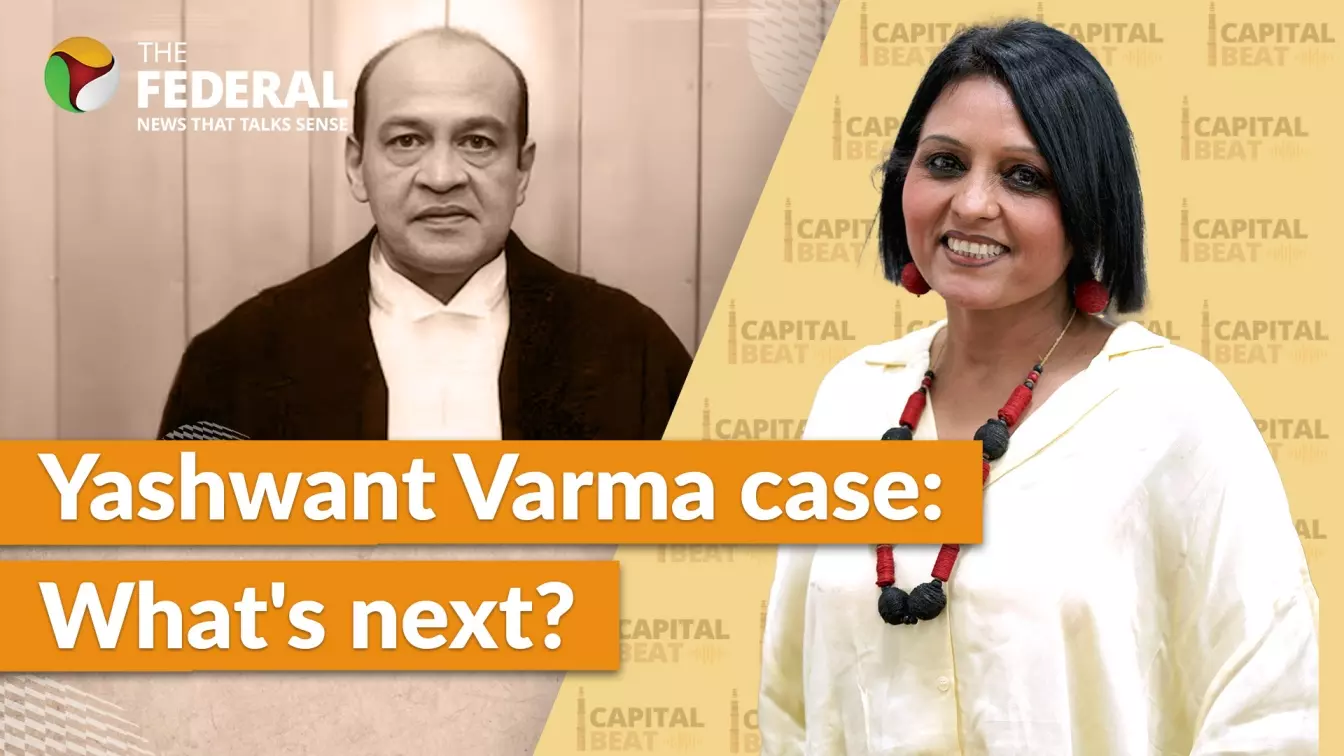
Justice Yashwant Varma case
Justice Yashwant Varma case: 'It's a litmus test for judiciary'
Here is a heated discussion on the controversy surrounding Justice Yashwant Verma and its implications

In this episode of Capital Beat, The Federal’s Neelu Vyas moderates a heated discussion on the controversy surrounding Justice Yashwant Verma’s transfer from the Delhi High Court to the Allahabad High Court. Joining her are senior Allahabad High Court lawyer Farman Naqvi and The Federal’s Political Editor Puneet Nicholas Yadav. The conversation delves into the legal and political fallout of the transfer, the judiciary’s response, and whether the government is seizing the moment to push for the revival of the National Judicial Appointments Commission (NJAC).
Strike in Allahabad
The Supreme Court collegium recently ordered the repatriation of Delhi High Court judge Justice Yashwant Verma to his parent court, the Allahabad High Court, following a fire at his residence that revealed charred currency notes. This triggered an immediate backlash in Allahabad.
Senior advocate Farman Naqvi confirmed that the Allahabad High Court Bar Association has launched an indefinite strike in protest. "We passed a resolution that he should not be repatriated. The inquiry should conclude in Delhi itself," Naqvi said.
He argued that Verma’s alleged misconduct occurred in Delhi, not in Allahabad, and that transferring him to Allahabad serves no constructive purpose, especially since he’s barred from judicial work either way.
Also Read: Cash discovery: Allahabad HC lawyers on indefinite strike over transfer of Justice Varma
Mounting pressure and vacancy woes
Naqvi also raised concerns about the broader strain on the Allahabad judiciary, which is functioning at below 50% of its sanctioned judicial strength. "I filed a writ petition today, but due to the strike, it couldn’t be heard," he noted, urging that appointments be expedited under the existing Memorandum of Procedure (MoP).
He emphasised the unsustainable workload on existing judges, pointing out that some judges face 600–800 listed cases a day. "At least 10 minutes should be given per case. It’s not possible," he said, adding that lawyers and litigants are both overwhelmed.
A judicial flashpoint
Puneet Nicholas Yadav framed the situation as a moment of deep institutional strain. “The entire episode is murky. But the real story now is how this is being used to relaunch the NJAC debate,” he said.
Also Read: Cash-discovery row: SC collegium confirms transfer of Justice Yashwant Varma
He pointed out that Vice-President Jagdeep Dhankhar had convened a meeting of Rajya Sabha floor leaders to discuss either the Verma case or judicial appointments more broadly. Puneet added that the conversation around NJAC has been re-energized, with top lawyers like Harish Salve and Mukul Rohatgi joining the chorus.
“There are three issues: the Verma case itself, the media trial, and the government’s interest in judicial appointments. These are all now colliding,” he said.
Media trials and reputational damage
Puneet warned of the damage caused by premature conclusions in the absence of concrete facts. “There are too many loose ends in either version of the story. But the media trial has already damaged Justice Verma’s reputation,” he said.
He also flagged procedural lapses in the inquiry, noting that while the incident occurred on March 14–15, police officials only submitted their phones for review nine days later.
Also Read: Cash discovery row: Judicial work withdrawn from Justice Yashwant Varma, says Delhi HC
“The apex court has perhaps gone overboard in its transparency, publishing videos and correspondence on its website. But it may be doing damage control,” he observed.
Opposition missteps and government gains
On the political front, Puneet highlighted how the Opposition, particularly Congress leader Jairam Ramesh, inadvertently gave the government a handle on the issue. “It was Jairam Ramesh who raised the Verma case in Rajya Sabha. That allowed the Chairman to immediately pounce on it,” he said.
He slammed the lack of coordination within the INDIA Bloc. “There’s been no meeting of floor leaders this session. Everyone is raising issues in silos, without a cohesive strategy,” he added.
He warned that such moves allow the government to chip away at judicial independence, stressing that both the government and opposition seem uninterested in a truly independent judiciary.
Strike or standstill
Farman Naqvi insisted that the transfer amounts to punishment. “He is being sent back to his home court with a cloud over his head and barred from work. That’s not a neutral move,” he said.
He also reiterated the Bar’s stand: “If an inquiry in Delhi proves him innocent, we will apologize.” But he demanded to know why no FIR has been filed yet, where the recovered cash is stored, and whether due process was followed.
He accused certain legal voices of selectively using the case to undermine the Collegium system. “Why didn’t they raise their voices in the Shekhar Yadav case? Why now?” he asked, alleging a political design behind the timing.
Also Read: Burnt cash row: In-house probe mooted by SC enters key stage
Judiciary at crossroads
In his concluding remarks, Puneet said this episode is a litmus test for judicial accountability. “This is a wake-up call. The Collegium must build better mechanisms—both for appointment and for crisis response,” he urged.
He emphasised the gravity of Dhankhar’s recent remarks on judicial oversight of legislation. “It’s dangerous territory. We’re not just debating one judge—we’re debating the future balance of power,” he said.
Puneet ended with a blunt assessment: “Neither the government nor the Opposition wants a truly independent judiciary. The responsibility now lies with the judiciary to safeguard its autonomy.”
(The content above has been generated using a fine-tuned AI model. To ensure accuracy, quality, and editorial integrity, we employ a Human-In-The-Loop (HITL) process. While AI assists in creating the initial draft, our experienced editorial team carefully reviews, edits, and refines the content before publication. At The Federal, we combine the efficiency of AI with the expertise of human editors to deliver reliable and insightful journalism)

